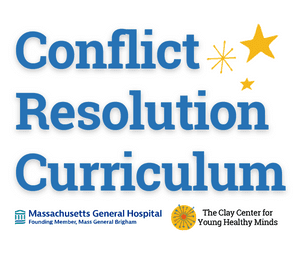
School Programs: Conflict Resolution
Developed by Dr. Gene Beresin, Executive Director of the Clay Center and Senior Educator in child and adolescent psychiatry at Massachusetts General Hospital, our conflict resolution curriculum provides educators a holistic approach to teaching students how to build the necessary life skills to identify and manage conflict in a healthy way. By learning to address and overcome conflict, we can improve our relationships and achieve positive and personal growth.
Learning Objectives
At the end of the Conflict Resolution Curriculum, students will be able to:
- Identify different kinds of conflicts in their lives;
- Craft strategies to attempt resolution of a conflict;
- Identify when a conflict is getting worse and attempt to de-escalate;
- Understand when a conflict is fully resolved or more work needs to be done;
- Help advise others who might need help resolving conflicts;
- Consider ways to address conflict within a community or societal level.
Program Overview
Conflict Resolution will be explored in four sessions:
1. LEARNING FROM THE ARTS + MEDIA
- In-Class Session
- Defining Conflict and its Resolution
- Key Principles of Conflict Resolution
- Exploring Conflict Resolution Through TV and Film
- Home Reflection Activity
2. APPLYING TO REAL LIFE SCENARIOS
- In-Class Session
- Break-Out Group Discussions on Student Scenarios
- Practicing Principles of Conflict Resolution Through Student Role Play
- Home Reflection Activity
3. CHANGING THE CULTURE OF A COMMUNITY
- In-Class Session
- Practical Strategies for Community Conflict
- Applying Strategies to Community-Based and Societal Concerns
4. GROUP REFLECTION AND NEXT STEPS
- In Class Session
- TV/Film Clip
- Final Group Discussion
- Student Survey
Learn More
Learning to resolve conflicts is a healthy manner is a skill that can be taught and developed over time. Like many things, it takes practice to grow and gain confidence in our abilities to de-escalate conflict and work towards positive resolution and healthy school communities.
If you are interested in learning more about this program or bringing this curriculum to your school or organization, contact Michelle Marshall.


 Share
Share
 Tweet
Tweet
